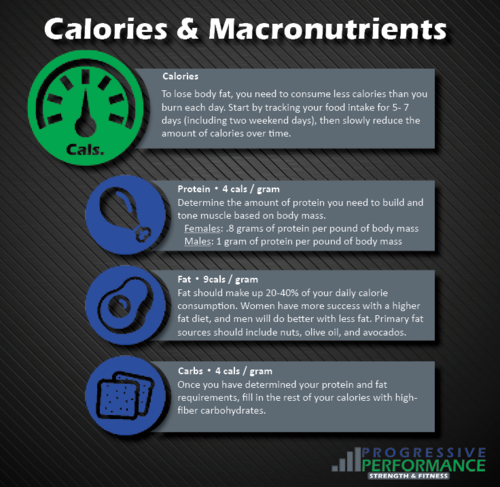Table of Contents
ToggleCALORIES
The number one thing to be concerned with is calorie consumption. The science is so ironclad about this that it is undeniable. There are a lot of fad diets out there that will tell you that including or excluding certain foods or categories of food will make or break your diet. This notion is just plain false. Understanding the relationship between the amount of calories you expend versus the amount of calories you consume is the number one thing that will lead you to diet success. To lose weight, you must expend more calories than you consume. To do this, first you must determine how many calories you are eating. The easy way to figure this out is through tracking your food. If you are not doing that currently, start now. Track your food for 5-7 days, including 2 weekend days, to figure out a baseline calorie amount to start from. Beginning your diet there then, slowly cutting calories over time is the path to success. If you want to lose weight then start with a calorie cut of about 5{885586236f5820200058e61f9e2fcec1023d525f8b1a6e4e5a4fd7f3c0d65acb} of your total calorie intake, if you still are not losing weight after two weeks cut another 5{885586236f5820200058e61f9e2fcec1023d525f8b1a6e4e5a4fd7f3c0d65acb}. If you manage your calorie intake, you are 60-70{885586236f5820200058e61f9e2fcec1023d525f8b1a6e4e5a4fd7f3c0d65acb} of the way to a successful fat loss diet.
MACRONUTRIENTS
A macronutrient is any calorie-containing nutrient made up of protein, carbohydrate or fat. Different foods will contain different amounts of each of these macronutrients. When we look at how each of these nutrients needs to be distributed for optimal fat loss, things get a little complicated. I will lay it out as best I can and as always let me know if you have any questions.

Protein-
The government recommendations for protein is based on how much protein one needs to function, not how much protein one needs to produce an optimal rate of fat loss or muscle gain. When you look at the recommended daily allowance for protein, for men it’s 80g a day and for women it’s 60g. This is for a sedentary adult that is not strength training and is not concerned with building or preserving muscle mass. If we look past what the government recommends and look at the science behind muscle building the recommendations for individuals who strength train are .8g per pound of body mass for a female and 1g per pound of mass for a male. This is where you should set your protein numbers for best success.
Fats-
The amount of fat you have in your diet is linked to healthy hormone levels and blood lipid profiles (the amount of cholesterol and triglycerides in the blood.). Fats are important for keeping you full and healthy. Fats should be set anywhere between 20{885586236f5820200058e61f9e2fcec1023d525f8b1a6e4e5a4fd7f3c0d65acb} and 40{885586236f5820200058e61f9e2fcec1023d525f8b1a6e4e5a4fd7f3c0d65acb} of your total calorie intake. Women tend to have better success with a higher fat diet, where men tend to do better with a lower fat diet.That being said, your fat choices do matter. It has been shown that diets comprised of predominantly mono and polyunsaturated fats provide a healthier blood lipid profile than those diets comprised predominantly of saturated fats. That is not to say that you can’t enjoy some cheese or a burger every now and then, as saturated fat has its place in testosterone production, but stick to the avocados, nuts and olive oil for the most part.
Carbs-
Carbs are the least understood macronutrient among the general population. Carbs are not good or bad, they are just nutrients and the amount of carbs that your diet should contain depends heavily on how much exercise you participate in. Once you have figured out the other nutrients and the amount of calories they will take up, you can then fill the rest of your calories with carbohydrates. It’s that simple. If you are eating a 2,000 calorie diet to lose weight and fats and proteins make up 1,200 calories the remaining calories will be made up of carbohydrates. It is important to remember that protein and carbohydrates are 4 calories per gram, while fats are 9 calories per gram. So, if you have 800 calories of carbs to meet, that is going to be 200g of carbs.
With these two scientific truths about fat loss and dieting you are well on your way to diet success. If you have any questions or need some help with organizing your diet send me a message here : [email protected]
If you are interested in getting your body ready for summer and really dialing in your nutrition and training click here to get started, you won’t regret it.



